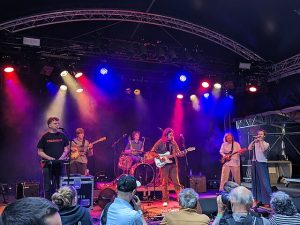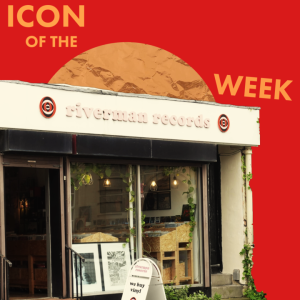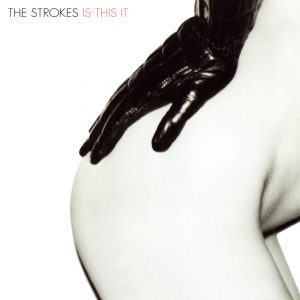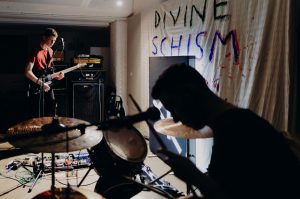In Conversation With: Tapir
by Florence Allen | March 9, 2024

Following the release of their first album The Pilgrim, Their God and The King of My Decrepit Mountain, Ike Gray, Ronnie Longfellow, and Wilfred Cartwright from the six-piece band Tapir! performed an intimate gig at Truck Store, Oxford. Despite the reduced size of the band, they deliver an incredibly beautiful performance. As the audience crowded in between the record shelves, careful not to knock anything over, you almost felt like part of the band. The familiar quips and conversation from all three members between each song only added to the sense that despite having never met them, you were there as a friend rather than an outsider. After the gig, I summoned the courage to go and talk to the band, asking about their new album, their artistic ideas, and their goals in the future.
I really like your mix of instrumentation, and you’ve got some unusual instruments in there like the cello. How did you all come together as a band and find each other?
Ike:
Just over time. I guess the first year we were playing and making stuff was very organic. It started with just a couple of us and then kind of built from there. And a lot of people in the band are just very talented and good at multiple instruments.
Wilf:
It was pieced together over a really long time. It started with just Ike and Will, and then Tom and then Ronnie, and then that was kind of a four for a bit, so I was actually a big fan of the band, before I joined, I’d seen them a few times, then me and Emily joined—Emily plays cornet and I play cello, and I guess that kind of added the orchestral element to it.
Ronnie:
I’d also say for weird instruments, that before Wilf joined, we’d used a drum machine for the percussion and the beats and stuff, and I’d say that’s a weird instrument, and at the start it’s very drum machine-centric, because all the songs have a drum machine in, whereas live now we have Wilf playing drums, so from the beginning it was always quite weird.
Do you think that the change from drum machine to a real drummer affected your writing style?
Ike:
Yeah, it is nice to write for percussion as well, I think, if you have something in place. Playing live you can have more fun.
Ronnie:
We had a practise where Wilf came for the first time and we played ‘Gymnopédie’ with the drums, and I was like ‘Oh my god, I finally enjoy playing the song’. I loved the song as like a solo thing, but when Wilf came with the drums I was like ‘Oh my god I love it’, thank god for the drums.
Ike: *laughing*
‘Thank god for the drums’, that’s the headline for the release, ‘Thank god for the drums’.
You’ve done lots of world-building with your social media presence, your music videos and your album covers. Was that something that emerged gradually, or was it something you had planned from the start?
Ike:
So, when we started writing more songs, it was during lockdown, and around that time I started painting. And that concept was kind of just what I was painting, and then it kind of made sense to just put the two together. And then over time, we developed a story and world, it was nice. We’re trying to use music videos and live performance to flesh that out as much as possible. And the album’s done now, but hopefully we’ll be able to carry on building the story and building the world.
Did you paint the album covers yourself?
Ike:
Yes, some of them a lot quicker than others, but it’s a very forgiving style.
Ronnie:
Yeah, most of the artwork is Ike’s paintings, so we did a billboard and Ike painted it. The two shirts are Emily’s design, and the dink’s poster is also Emily’s bit, but most of the painting stuff is all Ike’s style.
Wilf:
All in-house.
Ike:
It’s a lot cheaper that way.
I really like your ‘piggy faves’ playlist on Spotify. Are the songs on there songs that have influenced you? What’s the idea behind that?
Ronnie:
Ahh, that is a niche one.
Ike:
Nice, I like that!
Ronnie:
I remember me and Will were just really quite bored one day and we were like ‘Ah bands tend to have one of them’ and we wanted to have a bit of fun, so me and Will were doing it and then we just put loads in and then we were like ‘Wait, other people should’, and then people put stuff in, but this was ages ago, and I don’t think we’ve touched it…
Ike:
Yeah, I wasn’t told about it.
Wilf:
I think we should do a new one.
Ronnie:
I really like that you’ve asked that because I thought that people didn’t know it existed.
Your music is very different from other pop being produced at the moment. Could you outline your song writing process and your main musical influences?
Ike:
A lot of the songs were written over a long period of time, and the nice thing with first albums is you can jump around different genres and inspirations, but at first, Will and I were trying to write narrative-driven songs inspired by Randy Newman… Harry Nilsson was a big one… So it kind of just made sense to put the concept around the songs, and it also helps with the writing process to have some kind of story in place, because I guess you can be more objective about it, and it’s not as personal. Other inspirations?
Ronnie:
Bach?
Wilf:
Yeah Bach, J.S Bach. Not sure how much it plays in the music but album 2 will be a big Bach cantata.
F: Really?
Wilf: *Laughing*
I hope so. They haven’t agreed to it yet…
Ronnie:
I agree to it, man.
Wilf:
Yeah, thank you, thank you. Well, I really, liked the band before I joined – the demos. It was the same time I was getting into Richard Dawson, also through Ike.
You obviously quote Eric Satié in Gymnopédie, what made you choose that specific song?
Ike:
I was just messing around at the time; it was just a silly song basically. But then I was looking into the history of the title of the piece, and I guess it already had a certain feeling to it that I think a lot of people can recognise. I thought it was a bit too on the nose at first.
Several articles that I’ve read about you mention that your work draws on paintings by Henri Rousseau and work by Henry Darger. What particularly appeals to you about their work?
Wilf:
I don’t know, I’ve never thought about Henry Darger in relation to us, that’s really cool though. Do you like Henry Darger? I love Henry Darger, I think he’s great.
Ike:
The nice thing about people saying those things and picking up on them is that a lot of it was very subconscious. I think maybe we get a lot more credit than we’re due in terms of intellectual referencing and stuff. To be fair, in the second EP, a lot of those songs like ‘Gymnopédie’ are definitely drawing and inspired by classical paintings, Renaissance-era stuff. But I don’t know that much about art itself, but I guess I try to go for it, and then if people draw comparisons, that’s really nice.
Ronnie:
I’d also say that even in our press release we have Henri Rousseau and Philip Guston mentioned, and I’d never heard of Guston before reading that, and then I went to the Guston exhibition at the Tate and I was like ‘Oh I can see why’. I think what I like about it is that it’s emotional music but it’s also quite silly. It’s quite playful and there’s sort of an irreverence to it. And that’s what I like about those painters as well. There’s a playfulness, it’s not just like ‘Oh we’re going to be serious’.
Ike:
The difference is that they can technically paint very well. I think having that kind of naïve approach to things can be a lot more freeing.
Now that you’ve released the album, we heard some of your new songs today, but do you have any new projects beginning to form?
Ike:
A couple of ditties.
Wilf:
A couple of ditties. With this album, a lot of the songs came first and then the band was put together, whereas now the band is together and there’s another album to write. So we’re kind of figuring out how that’s going to work and what the process will be.
Ike:
And giving ourselves time, now that this album’s out, I think that it’s nice, we can start with a fresh canvas basically, and form a new dynamic if that comes. And now that this album’s out it’s nice to spend time still working inside this world in another medium as well. So yeah, I don’t know, we’re trying not to put too much stress on what’s next.
Wilf:
I think it’s important to keep that playfulness and irreverence as much as possible, because that’s kind of the spirit of the band.
Ronnie:
I think that’s what brings everyone together in the band. Everyone’s quite silly.
Ike:
And I hope people see the humour in a lot of the things that we do. I think we’re trying not to worry about it too much, and just doing it.
I know we’ve just talked about not worrying about the future, but what’s your long-term goal as a band?
Ike:
I’d love to have some kind of meeting with Chris Martin. Our own streaming service as well.
Ronnie:
Yeah, peer-to-peer—get it? Peer Tapir!
Ike:
It’s not really something we’re that conscious of, to be honest, just see how it goes, which is why it’s so nice that people like this come – we never expected it from the start. We’ve got to do at least two more, we’re on a record deal, so you can expect at least two more records.∎
Words by Florence Allen.




